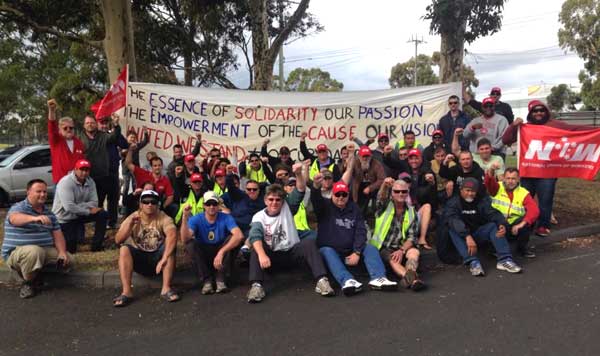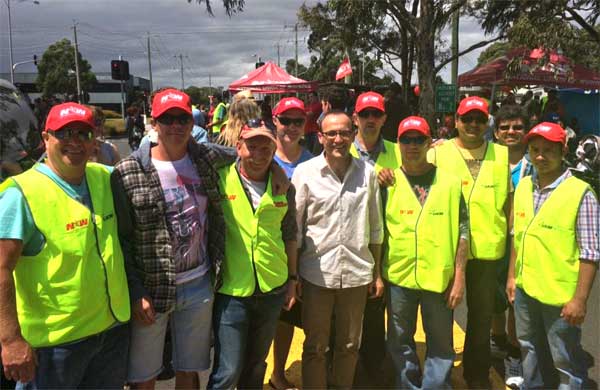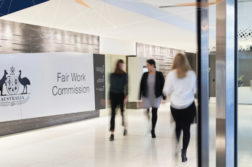A group of Melbourne workers have emerged victorious from their factory lunch room, after a four day sit-in pushed their employer International Flavours and Fragrances to agree to fair pay and conditions for the next three years.
A spokesperson for the National Union of Workers (NUW), which represents the IFF factory employees, said Fair Work negotiations had resulted in either a “good result” or “fair resolution” on all of the points on which workers took action.
The dispute over pay and conditions escalated dramatically last Tuesday when workers stormed the Dandenong factory and holed-up in the lunch room, after arriving for their morning shift only to find they’d been locked out.
In a statement released last week IFF said it had been left with “no choice” but to lock the workers out after the NUW instituted a paperwork ban, which the company claimed would affect food safety control checks.
But when the factory gates were opened to allow entry to a maintenance worker, around 30 employees who’d turned up for their 6am shifts rushed for the lunch room, which they occupied for the next four days.
Negotiations had been underway since September but the workers said their calls for existing conditions to be maintained, and a pay increase that was at least in line with the CPI, were not being treated seriously by IFF.
Negotiations at the Fair Work Commission got off to a slow start last week, but after the NUW pressured senior IFF management to fly in from Singapore and sit down at the negotiating table, an equitable agreement was reached over the weekend.

The union applied pressure to the Asia Pacific managers of IFF with a petition, which attracted nearly 1,000 signatures, calling on senior management to step in and resolve the stand-off.
This demand was met on Saturday, when senior management appeared at a third Fair Work hearing, and the workers abandoned their stronghold in the factory lunch room.
“IFF was able to get back to the table to negotiate again in earnest,” because workers had agreed to leave the lunch room, a company spokesperson said.
The company says it is happy with the agreement, which the NUW is hailing as a win for workers’ rights.
Existing conditions which had been under threat, including the right to two paid 10-minute breaks per day, will be maintained, according to NUW spokeswoman Emma Kerin.
Proposed changes to accrued sick leave have also been effectively blocked.
“No-one will lose accrued sick leave, and at December 2015 anyone with over 160 hours accrued will get that paid out,” Kerin said.
The NUW secured a pay increase, too, although it is less substantial than the union had hoped.
The union – which last week was arguing for a 2.75 per cent rise – nailed down a 2 per cent pay rise, which dates from 1 January this year.
Wages are set to increase each year, with the parties agreeing to 2.1 per cent increase in 2016, and a 2.2 per cent rise in 2017.

This is not the first time IFF’s Dandenong workers have had to fight their employer over pay and conditions, and the NUW says it hopes the most recent dispute will result in a permanent change in IFF’s management culture.
“This is a bit of a legacy from last time as well,” Kerin said.
“[IFF’s management] promised there’d be a change in the culture of management and how they responded and treated workers, and NUW members don’t feel that there’s been a change.”
She said the fact negotiations had broken down again, and workers had been forced to resort to a four-day sit in was “a clear indication there needs to be some fundamental change out there”.
But IFF CEO Andreas Fibig said “the fact that so many people choose IFF for lifelong careers is proof of our value as an employer and of the positive culture we have fostered throughout our 125 years”.
The NUW said that workers were committed to doing their bit to make sure communication was respectful and productive, but the industrial action had been a service to workers’ rights moving forward.
“If they allowed their basic conditions – which they’ve already fought for – to be taken away from them, then that would continue to happen,” Kerin said.
Donate To New Matilda
New Matilda is a small, independent media outlet. We survive through reader contributions, and never losing a lawsuit. If you got something from this article, giving something back helps us to continue speaking truth to power. Every little bit counts.



